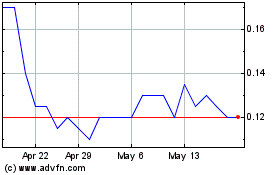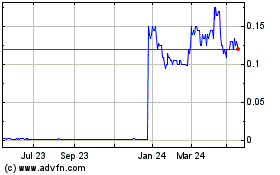The GTG ImmunAid Project - Fourth Progress Report
October 17 2006 - 10:27PM
Business Wire
Genetic Technologies Limited (NASDAQ:GENE)(ASX:GTG) is pleased to
provide the Market with a further progress report on its ImmunAid
project. This project seeks to improve the efficiency of treatments
for cancer and for other chronic diseases, such as AIDS, by
focusing in particular on harnessing the human immune system. GTG
reported in April 2001 that some early experiments conducted at the
University of Western Australia produced first results in a mouse
AIDS model which were described at the time as �quite remarkable."
As a consequence, a new research company was formed - ImmunAid Pty.
Ltd. GTG initially owned 60% of this company. Currently, GTG owns
65% of ImmunAid Pty. Ltd., with the balance held by scientists
associated with the project. In August 2000, a first patent was
filed by ImmunAid. In 2002, ImmunAid�s Technical Review Committee
urged the company to immediately expand this research from
laboratory animals to human monitoring trials. The relevant ethical
approvals were obtained and the first human monitoring trials then
began in Australia. In 2004, our initial success in mice was
reported in the scientific publication �The Journal of Immunology."
It appeared that the ImmunAid strategy may have prevented disease
progression by treating these mice at particular times. These
findings supported our belief that in certain diseases which are
associated with the immune system, the timing of treatment may be
critical. In turn, this led to the monitoring of patients with AIDS
and also certain cancers, including ovarian cancer, mesothelioma
and malignant melanoma. ImmunAid also filed additional patents,
covering various aspects of this novel strategy related to the
timing of treatment of various cancers, based on the detection of a
cycle in the immune system - and then synchronising the timing of
treatment to that cycle. We are pleased to now report further
progress. Human monitoring trials in Australia and in USA have
recently provided further evidence that the immune system may
indeed �cycle� in relation to certain diseases, including malignant
melanoma and ovarian cancer. Importantly, all of the cancer
patients examined in these trials demonstrated some degree of
cycling - in accordance with the ImmunAid strategy. These results
have also been statistically modelled, and the presence of the
ImmunAid cycle has been independently confirmed. At the invitation
of the internationally renowned Cancer Research Institute, ImmunAid
researchers this month presented a scientific poster at a major
cancer conference in New York. This presentation attracted interest
from leading cancer specialists and it is now anticipated that
several research organisations in USA plan to conduct their own
trials to demonstrate the presence of the ImmunAid cycle and to
time the treatment of patients accordingly. GTG is aware that one
such organisation has already treated its first patient in
accordance with the ImmunAid strategy, with further patients likely
to be treated over coming months. Clearly, the fact that leading
oncologists are now planning to treat patients in accordance with
the ImmunAid strategy provides independent evidence of the
significant progress being made by this project. We can now report
that ImmunAid is currently engaged in discussions with clinical
groups in USA and in Australia and with funding sources in USA who
have expressed interest in supporting and expediting the
commercialisation of this project. It should also be noted that the
market for more effective cancer treatments is significant. The
National Institutes of Health (NIH) in USA has estimated that, in
2003, the overall cost of all cancer-related illness in the US was
$189.5 billion. A scientific paper produced by University of
Chicago estimated the economic value of eliminating deaths from
cancer at $48 trillion, and noted �even a modest 1% reduction in
cancer mortality would be worth $500 billion." In Australia, in
addition to the pain, suffering and shortened life expectancy from
the disease, cancer costs the community an estimated $2.8 billion
annually. GTG is pleased to have encouraged and supported this
research and will continue to update the Market on the progress of
the ImmunAid project, as appropriate. Genetic Technologies Limited
(NASDAQ:GENE)(ASX:GTG) is pleased to provide the Market with a
further progress report on its ImmunAid project. This project seeks
to improve the efficiency of treatments for cancer and for other
chronic diseases, such as AIDS, by focusing in particular on
harnessing the human immune system. GTG reported in April 2001 that
some early experiments conducted at the University of Western
Australia produced first results in a mouse AIDS model which were
described at the time as "quite remarkable." As a consequence, a
new research company was formed - ImmunAid Pty. Ltd. GTG initially
owned 60% of this company. Currently, GTG owns 65% of ImmunAid Pty.
Ltd., with the balance held by scientists associated with the
project. In August 2000, a first patent was filed by ImmunAid. In
2002, ImmunAid's Technical Review Committee urged the company to
immediately expand this research from laboratory animals to human
monitoring trials. The relevant ethical approvals were obtained and
the first human monitoring trials then began in Australia. In 2004,
our initial success in mice was reported in the scientific
publication "The Journal of Immunology." It appeared that the
ImmunAid strategy may have prevented disease progression by
treating these mice at particular times. These findings supported
our belief that in certain diseases which are associated with the
immune system, the timing of treatment may be critical. In turn,
this led to the monitoring of patients with AIDS and also certain
cancers, including ovarian cancer, mesothelioma and malignant
melanoma. ImmunAid also filed additional patents, covering various
aspects of this novel strategy related to the timing of treatment
of various cancers, based on the detection of a cycle in the immune
system - and then synchronising the timing of treatment to that
cycle. We are pleased to now report further progress. Human
monitoring trials in Australia and in USA have recently provided
further evidence that the immune system may indeed "cycle" in
relation to certain diseases, including malignant melanoma and
ovarian cancer. Importantly, all of the cancer patients examined in
these trials demonstrated some degree of cycling - in accordance
with the ImmunAid strategy. These results have also been
statistically modelled, and the presence of the ImmunAid cycle has
been independently confirmed. At the invitation of the
internationally renowned Cancer Research Institute, ImmunAid
researchers this month presented a scientific poster at a major
cancer conference in New York. This presentation attracted interest
from leading cancer specialists and it is now anticipated that
several research organisations in USA plan to conduct their own
trials to demonstrate the presence of the ImmunAid cycle and to
time the treatment of patients accordingly. GTG is aware that one
such organisation has already treated its first patient in
accordance with the ImmunAid strategy, with further patients likely
to be treated over coming months. Clearly, the fact that leading
oncologists are now planning to treat patients in accordance with
the ImmunAid strategy provides independent evidence of the
significant progress being made by this project. We can now report
that ImmunAid is currently engaged in discussions with clinical
groups in USA and in Australia and with funding sources in USA who
have expressed interest in supporting and expediting the
commercialisation of this project. It should also be noted that the
market for more effective cancer treatments is significant. The
National Institutes of Health (NIH) in USA has estimated that, in
2003, the overall cost of all cancer-related illness in the US was
$189.5 billion. A scientific paper produced by University of
Chicago estimated the economic value of eliminating deaths from
cancer at $48 trillion, and noted "even a modest 1% reduction in
cancer mortality would be worth $500 billion." In Australia, in
addition to the pain, suffering and shortened life expectancy from
the disease, cancer costs the community an estimated $2.8 billion
annually. GTG is pleased to have encouraged and supported this
research and will continue to update the Market on the progress of
the ImmunAid project, as appropriate.
Genetic Technologies (ASX:GTG)
Historical Stock Chart
From Jun 2024 to Jul 2024

Genetic Technologies (ASX:GTG)
Historical Stock Chart
From Jul 2023 to Jul 2024
